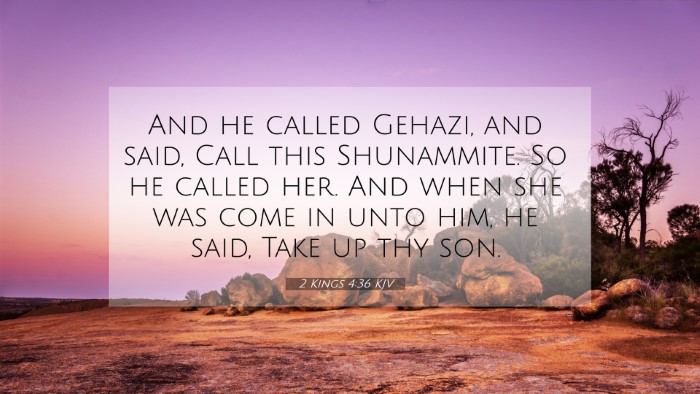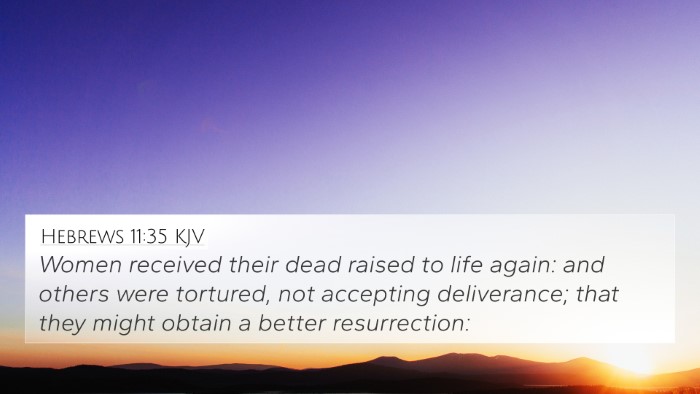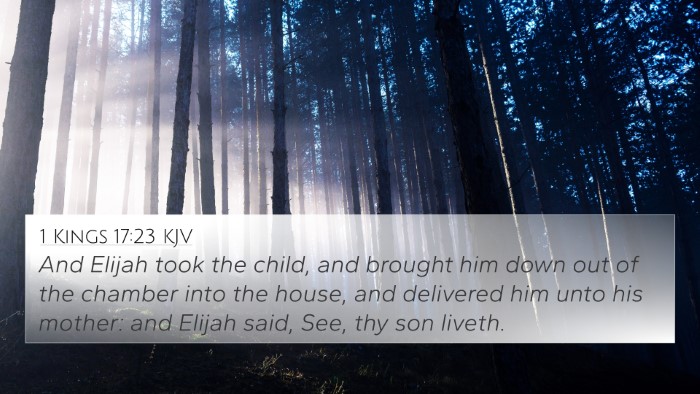Understanding 2 Kings 4:36
2 Kings 4:36 reads: "He called Gehazi, and said, Call this Shunammite. So he called her. When she was come in unto him, he said, Take up thy son." This verse marks a significant moment in the narrative of Elisha, highlighting both the miraculous power of God and the restoration of life.
Summary of Insights from Public Domain Commentaries
Matthew Henry's Commentary
Miraculous Restoration: This event demonstrates God's ability to restore life, reflecting His mercy and the prophetic authority Elisha possessed. The raising of the Shunammite woman's son signifies the divine intervention in human affairs, encouraging faith even in dire situations.
Role of Faith: The Shunammite's unwavering faith throughout her trials is evident. Even in despair, she sought out the prophet, illustrating profound trust in God’s prophets and ultimately in God Himself.
Albert Barnes' Notes
Elisha's Authority: Elisha's direct command to Gehazi to bring the Shunammite woman illustrates his leadership role. His assurance to her when she arrives exemplifies how God uses His servants to bring comfort and hope.
Response to Grief: Elisha’s calm authority provides a stark contrast to the emotional turmoil experienced by the woman, suggesting that faith can lead to calmness in the midst of storms.
Adam Clarke's Commentary
Symbol of Hope: The resurrection of the boy serves as a symbol of Christ's eventual resurrection and the hope that believers have in eternal life. This connection emphasizes the larger redemptive narrative present throughout the Bible.
Prophetic Role: Clarke stresses that actions taken by Elisha are not solely personal but part of a prophetic role filled with God's authority, showcasing how God operates through His prophets to effect change.
Bible Verse Cross-References
2 Kings 4:36 can be understood more deeply through various cross-references in Scripture:
- 1 Kings 17:17-24 - Elijah raises the widow's son, mirroring Elisha's miracle and underscoring the theme of resurrection.
- John 11:43-44 - Jesus raises Lazarus from the dead, linking the miracles of the Old Testament prophets with Christ’s ministry.
- Luke 7:11-17 - Jesus raises the son of the widow of Nain, highlighting God's compassion and power over death.
- Acts 9:36-42 - Peter raises Tabitha, showing the continuation of miraculous works through apostles in the early Church.
- Romans 4:17 - Discussing God's ability to bring life from the dead, reinforcing the belief in divine resurrection.
- Job 14:14 - Job's hope for resurrection mirrors the theme present in 2 Kings, expressing faith in God’s ability to restore life.
- Ezekiel 37:1-14 - The Valley of Dry Bones illustrates God’s power to restore life, providing a rich thematic connection.
Thematic Analysis and Connections
This verse showcases themes central to the Biblical narrative:
- Divine Intervention: Both Old and New Testament instances reveal God's direct involvement in human suffering and restoration.
- Faith and Trust: The Shunammite woman's faith parallels that of many biblical figures who turned to God in times of grief.
- Authority of Prophets: The distinction of God’s prophets serves as intermediaries between God and the people, a consistent theme throughout Scripture.
Conclusion
2 Kings 4:36 not only recounts an extraordinary miracle but also serves as an invitation to explore the connections between Bible verses. This narrative encourages us to understand the broader implications of faith and divine sovereignty. By engaging in cross-referencing these themes across Biblical texts, we deepen our understanding of God's promises and the continuity of His miraculous works through His chosen servants.
Tools for Bible Cross-Referencing
For those interested in further study, utilizing Bible concordance and a cross-reference guide can greatly enhance comprehension:
- Explore a comprehensive Bible cross-reference system for systematic study.
- Use Bible reference resources for in-depth exploration of themes.
- Investigate bible chain references to track themes throughout Scripture.
Engaging with Scripture
Understanding passages such as 2 Kings 4:36 is enriched by cross-referencing Bible study methods, allowing believers to grasp the interconnectedness of the Word of God. In every verse, connections can be drawn that illuminate God’s overarching narrative of redemption and hope.





